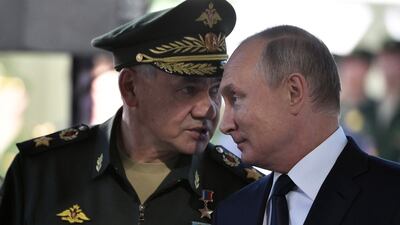Russia has replaced its defence minister with an economist in a sign of Moscow marshalling resources for a long war effort in Ukraine.
Sergei Shoigu, a long-time ally of President Vladimir Putin who had been defence minister since 2012, is being moved to Russia's security council.
Economic adviser Andrey Belousov will become the new defence chief in a shake-up at the start of Mr Putin's fifth presidential term.
Analysts told The National that Mr Belousov’s appointment means the military is looking to vastly improve its technological capabilities as he has been a specialist in driving drone procurement.
There was also a warning that with Russia putting its economy on a war footing by spending a huge 6.6 per cent of its GDP on defence, it could be preparing for a conflict with Nato, some members of which spend less than 2 per cent of their GDP on their military.
Meanwhile, Russia forces appear to be making progress in their summer offensive in Ukraine, taking territory north of the key industrial city of Kharkiv.
Long war, small economy
In the shake-up at the start of Mr Putin's fifth presidential term, Mr Shoigu has been demoted from defence chief to head of the Russia’s security council.
“This is actually a realisation that this is going to be a long war, that Russia can't afford their current arms usage rates with a small economy,” said retired British army officer Hamish de Bretton-Gordon. “Belousov’s understanding of economics might be more effective than somebody who just is firing more and more bullets.”
However, Col de Bretton-Gordon said sacking a general and replacing him with a civilian in a middle of war was “questionable logic”.
The Institute for the Study of War think tank highlighted that the reshuffle meant Mr Putin was “taking significant steps towards mobilising the Russian economy to support a protracted war in Ukraine and possibly prepare for a future confrontation with Nato”.

Tech maximum
Mr Belousov, who has served as economic minister for the past decade, was appointed was to “squeeze the technological maximum out of the defence industry”.
The economist, regarded as an effective technocrat who has a positive relationship with Mr Putin, has been involved in technological innovation projects including pushing through a $7 billion plan to produce 32,000 drones a year until 2030.
Explaining the surprise appointment, the Kremlin said rising defence spending fuelled by its invasion of Ukraine "must fit into the country's wider economy".
Russia has relied on its arms factories to churn out tanks and ammunition for the front line and absorb the impact of economic sanctions.
Mr Putin's spokesman Dmitry Peskov said the Defence Ministry "must be absolutely open to innovation" to gain the upper hand in Ukraine.
Kharkiv offensive
Mr Shoigu, 68, leaves his post with Russian and Ukrainian forces mired in a third year of a war that Mr Putin started in February 2022.
Mr Belousov, 65, will arrive at a ministry that appears to have learnt from its military mistakes in the early part of the war and is now taking territory in Ukraine, albeit at a high casualty rate of about 700 a day.
Russia has opened its summer offensive with attacks from its own territory, seizing villages about 30km north of Kharkiv.
This could be a feint to divert Ukrainian troops from other parts of the 1,000km front line, as well as to manoeuvre its artillery to within range of the city of 1.3 million people.
Besieging and seizing Kharkiv would take far more than the resources Moscow has thrown into the limited offensive.
But analysts have also blamed Russia’s advance on the “dithering” by western powers in providing Ukraine with military aid, with the recent US $60 billion package having been held up for months over Republican bickering in Congress.
“These advances should be a wake-up call that Russia could make such an impact in Ukraine that it actually draws Nato powers into the war,” said Col de Bretton-Gordon. “If this trickle becomes a torrent, then things could get very sticky this summer.”
Kremlin manoeuvres
Criticism of Mr Shoigu's handling of the war was aired in Russian military circles after troops failed to swiftly conquer Ukraine.
However, Mr Putin had stood by him until now, notably during a mutiny by mercenary leader Yevgeny Prigozhin last year.
Britain's Defence Secretary Grant Shapps said Mr Shoigu had overseen "mass civilian suffering" as well as hundreds of thousands of casualties in his own ranks.
The Kremlin said the chief of Russia's general staff, Valery Gerasimov, would be staying in post overseeing day-to-day operations in Ukraine.
Mr Putin was sworn in for another six-year term last week after winning a March election in which no serious challenger was allowed to run.
After having the constitution changed to get around term limits, he would now be eligible to rule until 2036, exceeding the duration of Joseph Stalin's time in power.

